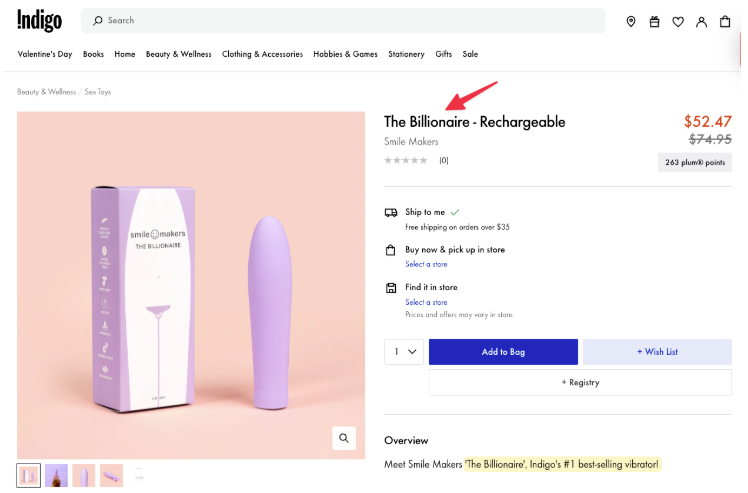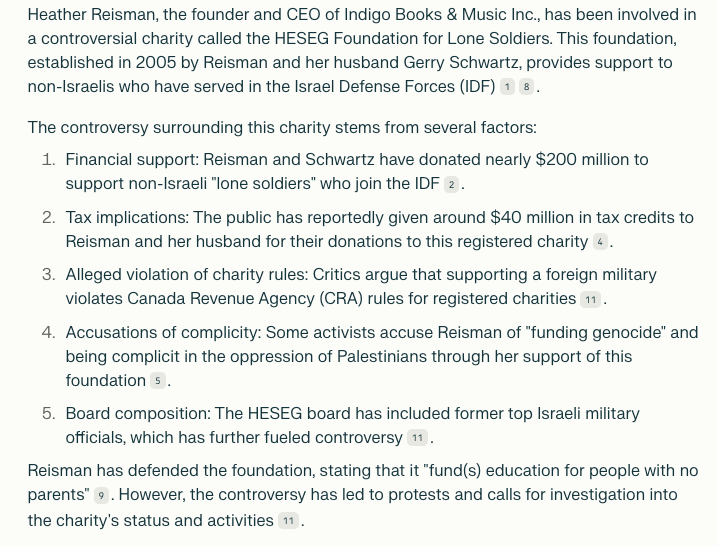Heather Reisman, founder and CEO of Indigo Books, revealed something in a podcast last year that conclusively shatters the myth that has been built around her. The interview took place in Montreal as part of the Startup Fest event and was a live recording of the Big Shot podcast by Shopify President Harley Finkelstein and David's Tea founder David Segal. As an aside, the talk was interrupted by a protestor who claimed that Heather "funded the genocide in Palestine":
Excerpt from the Big Shot podcast.
You can see Heather was quite willing to engage, but the other people in the room discouraged it. The heckler is one Yves Engler, who is a veteran activist. You probably assumed he was Arabic, didn't you? Heather countered by saying “The truth is, we fund education for people with no parents.” That would be a simplistic explanation. I put more details about this controversy in appendix below, if you care.
The podcast covered a lot of Heather's origin story. Her business career began when she was a single mother needing to support her two children. She started working at her brother's IT company, learning to code using the Basic programming language. She says she got so much into it, she was dreaming of code. But one day, she got shifted to a receptionist role, so she quit on the spot. She then co-founded an organizational change strategy consulting firm called Paradigm. Then she joined soft-drink bottler Cott when it grew sales from $100m to $900m in three years in the early 90s. Despite this success, there were tensions with the CEO who hired her, Gerry Pencer. For example, because he would tell dirty jokes in meetings and she would go “ballistic”. I see, so she doesn't believe in the Geneva Convention on Locker Room Talk either? She said their values didn’t align, she wasn’t passionate about selling pop, so she walked into Pencer’s office and resigned. That struck me as odd. No one knows women better than me and the only thing they love more than guzzling sugary drinks is men who tell dirty jokes.
My instincts were spot on. There is an alternate version as to why she left Cott. Apparently, in 1993, Heather made a profit of C$1.6 million selling Cott stock options but failed to file the required insider trading documents within the period mandated by law. Heather said the oversight was due to a back injury that kept her away from her office. Gerry Pencer, apparently responded to the situation by hiring another executive in 1994, Dave Nichol, that cast Reisman to the sidelines. So in this version, she left because she didn't want to play second fiddle to Nichol. He's the grocery exec who introduced the President's Choice brand that pretty much made Loblaws. He was a big star.
There's a third version of this story yet. Gerry Pencer was a friend of Heather's husband, the private equity mogul Gerry Schwartz. Heather initially joined Pencer's empire as part of the audit committee at his Financial Trustco Capital Ltd. Pretty soon, the trust company was engulfed by accounting and cash troubles that ultimately led to a bailout. Heather would later concede in an interview that she was "not equipped" for an audit committee role. And then, apparently Cott also had controversial accounting practices around the time Heather left. Bottom line, dirty jokes are perfectly fine. Email me if you need material.
Heather was the first woman to be inducted into the Canadian Business Hall of Fame, she has several honorary doctorates, the Order of Canada. I read that she “should be celebrated as one of this country’s most successful entrepreneurs.” On what basis? We now have the data to deliver a verdict.
Heather said she raised money for Cott, so had the connections to raise $25m to launch Indigo in 1997, just based on a business plan. In 2001, Heather was able to take over the much bigger Chapters chain for $121m. Indigo was taken private last year for $2.50 per share or a total market capitalization of $69m. From $25m to $69m in 27 years, this is not the stuff of capitalist dreams. There were some dividends along the way, maybe some buybacks, but I feel pretty confident saying that Heather has at best delivered GIC-like returns to her initial backers, to say nothing of her long-suffering public shareholders. The math might be even worse, since I didn't even include the additional capital raised along the way, including bailouts by her husband.
Heather's is a feel-good story based on nothing of substance. That is the cold verdict based on the only thing that matters - ROI. Harley claims his podcast “archives the stories of the greatest Jewish entrepreneurs of the last century.” Puh-lease, I could throw a rock in Forest Hill and hit a dozen Jewish entrepreneurs who are more successful than Heather Reisman. Of course, I won’t do that, that would be considered anti-semitic. In mitigation for Heather, I would say that Indigo was trading at $20 only a few years ago. The pandemic really hurt them. And of course, she can be forgiven for not being clairvoyant at figuring what Amazon would do to her business. For all I know, she managed a declining business as well as anyone could have. And there were some flashes of brilliance. She bet heavily on inventing an e-reader (called Kobo), a business she was able to divest in 2011 with a gain of $165m. That business was led by Michael Serbinis, a rocket scientist and iconic Toronto entrepreneur (subject to change without notice). One Ken Nickerson, a former Microsoft executive, also played a pivotal role in the Kobo story. Husband Gerry Schwartz, on the other hand, was apparently skeptical. Because he's averse to venture risk and had seen Heather's daughter Andrea Reisman's pet supply dotcom venture Petopia flameout after raising $150m.
As I really like to cover all my bases, it must be said that the potential for turning around Indigo is very real. Heather is still plotting a comeback at age 76. There's a bookstore renaissance both in the US and the UK. The Barnes and Noble chain is expanding again: 57 new stores last year. The Guardian recently wrote that bookstores were cool again, that millennials and Gen Z enjoyed spending time there and asking for recommendations from humans rather than algorithms. People now say that Amazon is for ordering boring books, like a medical textbook, while bookshops are for discovering great reads.

Much has been said about how Jeff Bezos launched a website initially just selling books, when all along his masterplan for world domination was to sell everything to everyone. But I am the only one who points out that Heather pretended she was a book merchant, when all along her masterplan was to corner the market for vibrators. To this day, she refuses to acknowledge this cunning strategy:
Heather used to attend Bilderberg meetings, she's perfectly capable of such Illuminati-grade thinking. Heather said on the podcast that marrying well was one of the keys to her success. So some authenticity there. Maybe Gerry runs an efficient household, I don't know.

BTW, Harley Finkelstein is big on DOGE and is agitating along with the Shopify right-wing broligarchy, but as recently as 2023, he donated to his local Liberal MP. Sad! Many years ago, Heather famously switched her allegiance from the Liberals to the Conservatives over some policy disagreement concerning Israel. On the latest kerfuffles, it's hardly worth saying that the people who vandalize Indigo bookstores or heckle talks by Heather are lunatics. But only I (and the Toronto Star) have the courage to say it was completely wrong for Heather to throw her weight around and phone the police chief twice about the vandalism. And even more wrong for the police chief to take her calls and then allocate what appears to be disproportionate resources to the investigation. Serious people don't create the appearance of undue influence in the administration of justice. This is the kind of thing that happens in Sri Lanka. Or the US. This is a pattern. Heather's initial plan was to bring US bookstore chain Borders in Canada. But she got rebuffed due to Canada's protectionist policies towards its cultural industry. That's when she decided to start Indigo from scratch. Eventually, she got approval to acquire Chapters and would go on to control nearly 50% of the book retailing market. How do you figure that happened? The Big Bad Banks or Telcos would dream of having that level of market concentration! Indigo was a menace to independent bookstores, but in the end, that proved a pyrrhic victory.
Appendix: Heather Reisman and the HESEG Foundation controversy
This is just a copy-paste from Perplexity, so don't blame me if anything is wrong.
